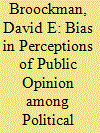| Srl | Item |
| 1 |
ID:
160556


|
|
|
|
|
| Summary/Abstract |
The conservative asymmetry of elite polarization represents a significant puzzle. We argue that politicians can maintain systematic misperceptions of constituency opinion that may contribute to breakdowns in dyadic representation. We demonstrate this argument with original surveys of 3,765 politicians’ perceptions of constituency opinion on nine issues. In 2012 and 2014, state legislative politicians from both parties dramatically overestimated their constituents’ support for conservative policies on these issues, a pattern consistent across methods, districts, and states. Republicans drive much of this overestimation. Exploiting responses from politicians in the same district, we confirm these partisan differences within individual districts. Further evidence suggests that this overestimation may arise due to biases in who contacts politicians, as in recent years Republican citizens have been especially likely to contact legislators, especially fellow Republicans. Our findings suggest that a novel force can operate in elections and in legislatures: Politicians can systematically misperceive what their constituents want.
|
|
|
|
|
|
|
|
|
|
|
|
|
|
|
|
| 2 |
ID:
158492


|
|
|
|
|
| Summary/Abstract |
Significant theories of democratic accountability hinge on how political campaigns affect Americans’ candidate choices. We argue that the best estimate of the effects of campaign contact and advertising on Americans’ candidates choices in general elections is zero. First, a systematic meta-analysis of 40 field experiments estimates an average effect of zero in general elections. Second, we present nine original field experiments that increase the statistical evidence in the literature about the persuasive effects of personal contact tenfold. These experiments’ average effect is also zero. In both existing and our original experiments, persuasive effects only appear to emerge in two rare circumstances. First, when candidates take unusually unpopular positions and campaigns invest unusually heavily in identifying persuadable voters. Second, when campaigns contact voters long before election day and measure effects immediately—although this early persuasion decays. These findings contribute to ongoing debates about how political elites influence citizens’ judgments.
|
|
|
|
|
|
|
|
|
|
|
|
|
|
|
|
| 3 |
ID:
172533


|
|
|
|
|
| Summary/Abstract |
Exclusionary attitudes—prejudice toward outgroups and opposition to policies that promote their well-being—are presenting challenges to democratic societies worldwide. Drawing on insights from psychology, we argue that non-judgmentally exchanging narratives in interpersonal conversations can facilitate durable reductions in exclusionary attitudes. We support this argument with evidence from three pre-registered field experiments targeting exclusionary attitudes toward unauthorized immigrants and transgender people. In these experiments, 230 canvassers conversed with 6,869 voters across 7 US locations. In Experiment 1, face-to-face conversations deploying arguments alone had no effects on voters’ exclusionary immigration policy or prejudicial attitudes, but otherwise identical conversations also including the non-judgmental exchange of narratives durably reduced exclusionary attitudes for at least four months (d = 0.08). Experiments 2 and 3, targeting transphobia, replicate these findings and support the scalability of this strategy (ds = 0.08, 0.04). Non-judgmentally exchanging narratives can help overcome the resistance to persuasion often encountered in discussions of these contentious topics.
|
|
|
|
|
|
|
|
|
|
|
|
|
|
|
|